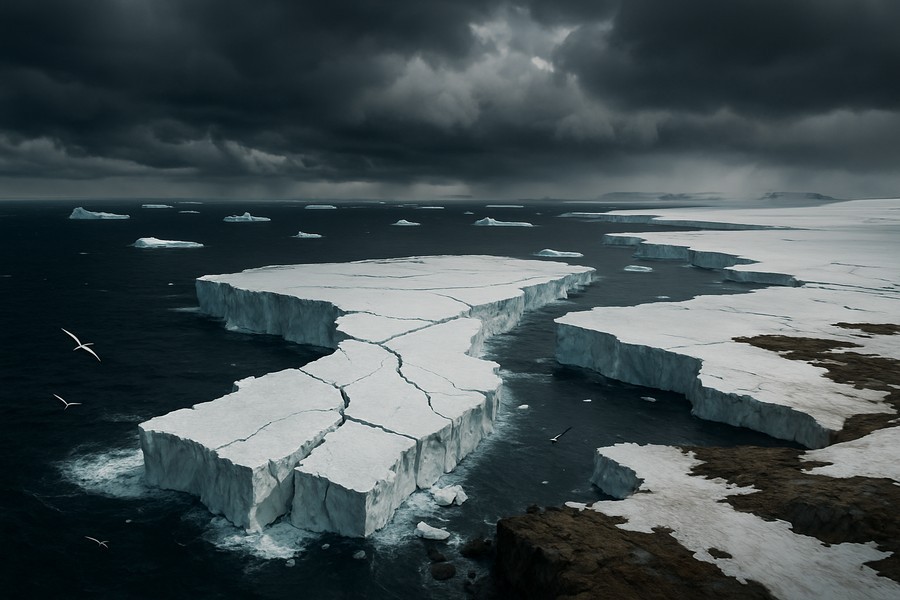
Antarctic Shifts Serve as a Global Warning
World-renowned researchers are sounding the alarm on swift and alarming transformations happening in Antarctica, which are far outpacing their initial predictions. These changes are anticipated to have a widespread impact not just on the icy continent but across the globe.
From the breakdown of ice shelves to an all-time low sea ice level, the dangers of fierce storms and the endangerment of fragile ecosystems, experts highlight that the remote and seemingly untouched Antarctica is nearing perilous turning points. These could speed up global warming, increase sea levels, and cause weather patterns across the world to go haywire.
The potential hazards of these fast-paced changes in the polar region are immediate and real, experts emphasize. They further clarify that extreme events are becoming more common and intense, with the likelihood of crossing irreversible tipping points increasing with each passing day.
The Impact on Our Planet
One expert, a key player at the National Climate Science Partnership and an oceanographer, commented, "Antarctica is undergoing changes at a rate far beyond what we had anticipated. These changes are already influencing ecosystems and communities worldwide. It's crucial that we take immediate action to reduce greenhouse gas emissions and bolster resilience if we wish to prevent crossing dangerous thresholds."
Following this alert, the tone for the two-day conference in London has been set. The director of the Antarctic Survey will start the event by reminding attendees that 'What transpires in Antarctica affects everyone.' This includes the repercussions of severe weather, loss of ecosystems, and rising sea levels.
The Southern Ocean that engulfs Antarctica soaks up most of the surplus heat generated by greenhouse gas emissions. This is already sparking stronger storms, heatwaves, and global rainfall, disrupting life far beyond the polar regions.
Threat to Ecosystems and Sea Levels
Meanwhile, vital species, such as krill, which forms the core of the Antarctic food chain, and deep-sea coral and sponge habitats, are at risk. These ecosystems support fisheries and biodiversity and even regulate the planet's carbon equilibrium.
Finally, experts have warned that if Antarctic ice sheets cross critical thresholds, sea levels could surge by over ten meters in the forthcoming centuries. This poses a threat to coastal cities, communities, and infrastructure worldwide. Moreover, historical evidence suggests that changes originating in Antarctica have the potential to spread rapidly, sometimes within decades, leading to potentially "devastating consequences" globally.
Linking Science and Policy
The conference, titled 'Global impacts of climate extremes in the polar regions: is Antarctica reaching a tipping point?' will explore the need for stronger ties between Antarctic science and global policy. This will allow governments to better anticipate the risks, protect future generations, and help everyone adapt to our changing world.
"We urgently need to understand these unprecedented extreme events in Antarctica if we're going to make robust predictions about future changes," said an oceanographer with the Antarctic Survey team. "The processes behind these extreme events, and any tipping points, are not well represented in computer models currently, so our forecasting ability is insufficient."
Unearthing Climate Secrets
This summer, ancient ice extracted from Antarctica was brought to Cambridge for detailed analysis. Extracted from depths of up to 2,800 meters in East Antarctica, these cores are expected to uncover a climate and atmospheric record spanning more than 1.5 million years. In the upcoming years, these samples will be meticulously analyzed in labs across Europe to reveal secrets about the Earth's climate evolution and greenhouse gas concentrations.
"Our data will yield the first continuous reconstructions of key environmental indicators – including atmospheric temperatures, wind patterns, sea ice extent, and marine productivity – over the past 1.5 million years," said the head of the ice cores team at the Antarctic Survey.
"This unprecedented ice core dataset will provide critical insights into the relationship between atmospheric CO2 levels and climate during a previously uncharted period in Earth's history, offering valuable context for predicting future climate change."
